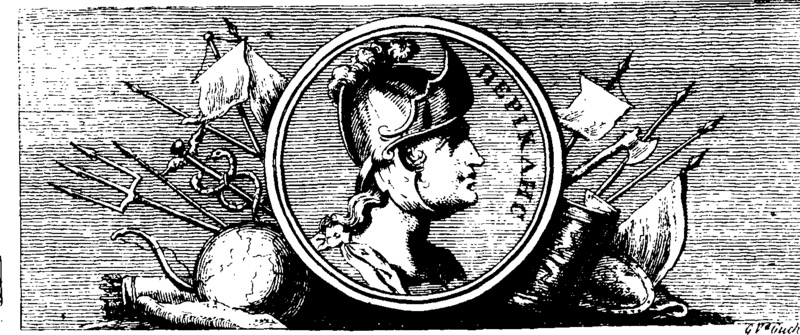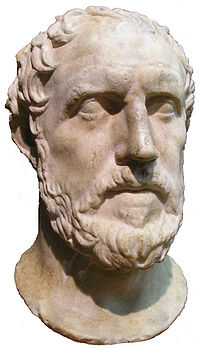
Winston Churchill and Thucydides
Q: Churchill’s acquaintanship with Thucydides
(Updated from 2012.) I am a post-doc at Tübingen University writing a paper about Sir Winston Churchill’s appreciation of Thucydides. Did he possess a personal copy of the ancient historian’s History of the Peloponnesian War? I would be very grateful for any help. —O.S., Germany
A: Powerful influence

I cannot confirm that Churchill owned a copy of Thucydides’ Pelopponnesian War. His original library is not intact. It would seem logical that he did. Churchill certainly read and appreciated the works of the great Greek historian. And the writings of Churchill have often been compared to those of Thucydides.
Churchill first read Thucydides as a boy at Harrow or Sandhurst (where it was in the curriculum). In September 1913, on a cruise aboard the Admiralty yacht Enchantress, Churchill and his private secretary, Eddie Marsh visited Greece and Sicily. The Prime Minister, H.H. Asquith, a great scholar of the classics, was on board, and Marsh recorded that Asquith “brushed up on his Thucydides for the occasion.” Churchill and Asquith then held forth on the Peloponnesian War.
T. E. Lawrence (of Arabia) compared Churchill’s memoir of World War I, The World Crisis,with the writings of the Greek: “I suppose [Churchill] realizes that he’s the only high person since Thucydides and Clarendon who has put his generation imaginatively in his debt.”
Similar comparisons of Churchill to Thucydides were made by the historian R.W. Thompson about Churchill’s memoir, The Second World War (1948-54); and, more recently, by Professor Paul Rahe of Hillsdale College about Churchill’s The River War (1899).
“A possession for ever”
In 1905 the literary agent Frank Harris read the manuscript of Churchill’s biography of his father, Lord Randolph Churchill, writing to Winston Churchill: “[I]t will be as Thucydides said of his own history a ‘a possession for ever. ’”
In 1931 Oliver Locker-Lampson, reviewing The Eastern Front, Churchill’s final volume of The World Crisis, wrote:
No greater writer of the English language exists today. Mr. Churchill is our modern Macaulay; or rather today’s Thucydides…. Some day someone will do justice to this great Englishman. Meantime, let us read his resounding record and be renewed by the vigour of his patriotism and versatility.
Churchill himself wrote nothing specific about Thucydides, but mentioned something Lord Beaverbrook sent him in 1942. Beaverbrook was Minister of Aircraft Production, where he had proven invaluable. Churchill wrote:
He also sent me, undated, the following quotation from Thucydides, which he had perhaps tried in vain upon himself: “Open no more negotiations with Sparta. Show them plainly that you are not crushed by your present afflictions. They who face calamity without wincing, and who offer the most energetic resistance, these, be they States or individuals, are the truest heroes.” —The Hinge of Fate (London: Cassell, 1950), 74.
By “Sparta” Beaverbrook was referring to Churchill’s critics. The war had been going badly, but Churchill had won a vote of confidence by 464 votes to 1 in January. The quotation was good advice for Churchill. It was also for Beaverbrook, but he didn’t take it. Shortly after sending this message, he resigned.
Further reading
“Winston Churchill’s Three Best War Books,” 2020.
“Churchill and Lawrence of Arabia: A Conjunction of Two Bright Stars,” 2020.






